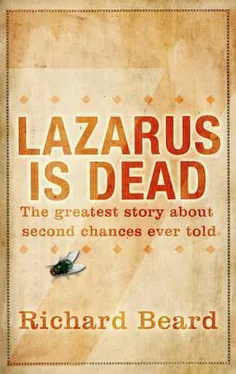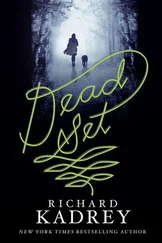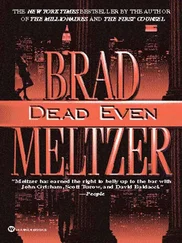‘They should marry,’ Cassius interrupts. ‘Set a good example.’
‘In a perfect world,’ Isaiah says, ‘I agree. But none of the priests are going to buy lambs from a dead man, not for some time to come. That’s the reality.’
‘He has the gift of healing,’ Cassius says. ‘Saloma is recovering. What more do you want?’
Isaiah wouldn’t mind knowing the future, if Cassius is asking, and also how to measure happiness. An explanation of luck and the nature of god would be useful, and a guide to what awaits us after death. Lazarus can’t even remember whether the afterlife is good or bad, which would be valuable information to have.
‘We’re very grateful,’ Isaiah says, ‘but we also have to be careful. Look at Jesus. Healing is fine, but there are limits.’
‘Help us to organise a gathering,’ Cassius says. ‘Lazarus, what do you think?’
He thinks it is never too late to start again and he should try to do some good. Lazarus knows he didn’t heal Saloma. He didn’t even touch her, but so much depends on belief.
‘We should so something here, at the pool,’ Lazarus says. ‘I know what it means to be sick, and people will come.’
‘Excellent idea,’ Cassius says. ‘Remind people you’re alive. Unlike some others.’
‘I wish I could help,’ Isaiah says, ‘but I can’t. Not on the Sabbath.’
‘Then we’ll do it tomorrow, Sunday morning. We’ll make this a Sunday Jerusalem never forgets.’
‘Can you show me the way?’
A man with an eye infection is trying to find the edge of the pool. His trachoma is so advanced that his eyelids have swollen and turned inward, the eyelashes scratching the cornea.
‘I can tomorrow,’ Lazarus says.
‘Will you tell me when the angels pass by?’
‘Tomorrow morning. We’ll bring good news, something for everyone.’
Isaiah is impatient to get home. He wants to monitor Saloma’s recovery.
‘Lazarus has the support of Rome,’ Cassius reminds him. ‘We will look favourably on any assistance you can offer.’
‘I’ll send out Arab messengers. They’re not constrained by the Sabbath, and they’ll let everyone know.’
This is enough, and Lazarus and Cassius watch Isaiah leave. They have until tomorrow to organise a memorable event.
‘I think Jesus would have wanted this.’ Lazarus says. ‘Every time he looked up, when he was dying, his eyes searched for mine. Every time.’
Cassius nods, even though Lazarus exaggerates. Every time Jesus raised his head his eyes searched for Cassius. It was distinctly unnerving.
‘Yes. He knew you were the one. He was making you accountable, handing on the role.’
They exchange some ideas, feeling for the shape of the future.
‘It will have to be spectacular,’ Cassius says. ‘Did you ever feel you could do what he did?’
‘He was the follower, not me. We’re different, but in Nazareth I was never second-best. We need something exceptional, completely convincing.’
The Romans control the water supply to the city, and have done since they built the high-level aqueduct. By opening sluice gates elsewhere in the watercourse they control the levels in the Bethesda pool.
‘You control the water in and out?’
‘Of course we do. Jerusalem wouldn’t have clean water if it weren’t for us.’
‘So you can make the surface of the water tremble?’
‘Whenever we like, just by regulating the system.’
Lazarus laughs. He now understands why the water moves, but the precise moment can still be ordained by god, and angels may still pass by. ‘You’ve given me an idea for tomorrow,’ Lazarus says. ‘Let’s plan the biggest miracle since the day I walked from my tomb.’
They agree on the timing and the general principle. Cassius will arrange the details while Lazarus stays out of sight. The effect will be more dramatic if everyone wonders where he’s gone, and whether he’s coming back.
Cassius puts his hand on Lazarus’s arm. ‘Don’t worry about the betrothal. We can change Isaiah’s mind.’
*
In most fictional accounts biblical prostitutes are unhappy. They are women who have made wrong choices, or against whom circumstances have conspired. In Philip Pullman’s The Good Man Jesus and the Scoundrel Christ (2010) his scoundrel Christ pays for sex with a woman who has an ulcerating cancer of the breast. Christ fails to heal her.
After listening to Jesus preach, Lydia knows that life doesn’t have to be like this. There are other possibilities. It is Saturday and Jesus is dead, but from her own experience she is not appalled or especially surprised by an unhappy ending. His teachings still apply, and life will improve for those who live it well.
In Bethany, Lydia borrows the loom that belonged to Absalom’s mother. She assembles it in the empty upstairs room of the abandoned Lazarus house, and hums to herself as she slides the yarn back and forth, finishing a blanket that Mary once promised to Absalom. Mary stays in Jerusalem, because the city is where she feels she should be.
Lydia waits in Bethany.
When Lazarus was dying — and Lydia heard this from Martha, so it must be true — Lazarus had asked for her. He has a second chance, and he wouldn’t come back to life to make the same mistakes.
At some stage, and this is equally true for the historical Jesus, we must avoid a preoccupation with attempts to establish factual propositions.
The evidence about Lazarus is fragmentary, and may have been misinterpreted in the two thousand years between then and now. Textual and pictorial records can be transmitted inaccurately, or contain errors inserted by copyists.
At best, the Synoptic gospels (Mark, Matthew and Luke) can be regarded as conveying an oral tradition both embroidered and embellished. John, as I’ve already mentioned, is demonstrably creative in his structuring of events. So where else is there to look? How can we ever be sure?
A point of stagnation has been reached in scholarly and theological studies. A new approach is needed, and imaginative representations are an undervalued source of data. Evidence can be extrapolated through careful research, making a significant contribution to the sum of our knowledge.
With Lazarus, but also in many other fields, innovative discoveries can be made by trusting the historical human imagination. Admittedly, reconstructions have to be revised as new imaginative records become available, but biographers should stay faithful to the patterns that consistently emerge.
Jesus will soon be resurrected. Lazarus will stop smiling for the foreseeable future. These improbabilities have been documented at length, and cannot now be ignored.
It is Saturday night. Lydia is naked.
Lazarus looks ahead, feels for the shape of his destiny because any life he can imagine may be the life that comes true.
‘Will you marry me?’
Lydia detaches the half-finished blanket from the loom and lays it on the floor in the upstairs room. They have a sack of flour as a pillow. Lazarus too undresses, lies beside her, and from the darkness outside crickets provide a pulse to the warm-blooded night.
‘This house,’ Lazarus says, ‘is as empty as death.’
‘And that’s not all bad, is it?’
The information that Lazarus has struggled to communicate is now familiar, but at the time, when Lazarus brought back his lack of knowledge, it was radical and new: god is everywhere and nowhere, before and after, real and fictional, in any given case a concept that words will never capture.
‘Not the scriptures?’
‘Not even the Jewish scriptures.’
Lydia brushes the back of her hand over his growing beard, dark with specks of grey on the chin. She is close to him but distant, and T. S. Eliot salvages her attitude in The Love Song of J. Alfred Prufrock (1917): ‘Would it have been worthwhile’, he asks, ‘To say: “I am Lazarus, come from the dead, / Come back to tell you all, I shall tell you all” — / If one settling a pillow by her head,/Should say: “That is not what I meant at all. / That is not it, at all.”’
Читать дальше












